Stomach ulcers, also known as peptic ulcers, are a common health issue that can cause discomfort and pain in the abdominal region. They occur when the stomach's protective lining is damaged, and the acidic digestive juices irritate the exposed area, forming sores. If left untreated, stomach ulcers can lead to more serious complications, such as internal bleeding or perforation of the stomach wall. Thankfully, there are various medical and non-medical treatment for an ulcer in stomach that promote healing. In this blog, we will explore the different treatments, including medications and lifestyle changes, that can help alleviate the symptoms of stomach ulcers and prevent further complications.
What is a Stomach Ulcer?
A stomach ulcer, also known as a gastric ulcer, is an open sore that forms in the stomach lining. You can also acquire one in the duodenum, the initial portion of the small intestine into which the stomach feeds. Peptic ulcers include both duodenal and stomach ulcers. They're called after pepsin, a digestive liquid in the stomach that can sometimes spill into the duodenum. These juices are the factors of peptic ulcer.
What are the signs and symptoms of peptic ulcer disease?
Some peptic ulcers are asymptomatic. These are known as "silent ulcers." Some symptoms include.
- Burning stomach.
- Stomach bloating.
- Indigestion, especially after eating fatty meals.
- Vomiting and nausea.
What are the Causes of stomach ulcers?
- H. pylori bacteria and a type of pain medication known as nonsteroidal anti-inflammatory drugs (NSAIDs). These are the two main causes of stomach and intestinal wall ulcers.
- Excessive gastric acidity, heartburn, and Zollinger-Ellison syndrome are less prevalent causes of stomach ulcers.
- Various factors, including heredity, smoking, stress, and certain diets, can cause high gastric acidity.
- Zollinger-Ellison syndrome is an uncommon illness that causes an overproduction of stomach acid.
Book an online appointment with the Best Peptic Ulcer Doctors in India
What are the Treatment Options for stomach ulcers?
Suppose a doctor diagnoses a patient who seems to have a stomach ulcer and suspects the cause is an NSAID. In that case, they may try to modify the type of pain medication the person is taking and prescribe another, such as paracetamol. If the doctor believes the H. pylori bacteria cause the stomach ulcer, they may use the "test-and-treat" method. This method includes a noninvasive test for H. pylori infection, such as a urea breath test or stool test, followed by eliminating the bacteria if they are present. Once the doctor has determined what is causing the ulcer, try to relieve the symptoms by keeping the ulcer with acid while that heals. Also Read: How Contagious Is The Stomach Flu?
Doctors may prescribe the following medications:
- Proton pump inhibitors prevent acid-producing cells from functioning.
- H2 receptor antagonists stop the stomach from creating too much acid.
- Antacids or alginate are available at pharmacies or online, as are medications that heal the stomach lining, such as Pepto-Bismol, which is also accessible online.
- Symptoms usually go away immediately after therapy. Doctors, however, prolong the medication, particularly if an H. pylori infection causes the ulcer.
- During treatment, it is also crucial to refrain from drinking alcohol, using cigarettes, and eating any trigger foods.
Surgical procedures -
Surgery may be a solution in some circumstances, such as if the ulcer recurs, does not heal, bleeds, or stops food from exiting the stomach.
Surgical procedures may include:
- Removal of ulcer
- Tying off bleeding blood vessels.
- Sewing tissue from some other location onto the ulcer.
- The nerve that regulates stomach acid production will be severed.
- Stomach ulcer complications, such as bleeding or perforation, are uncommon. Either of these conditions needs immediate medical intervention.
Home-based natural treatment for an ulcer in stomach -
Different home natural remedies may also help in the healing process and reduce symptoms. Here are some natural treatments that may help treat an ulcer in the stomach:
1. Probiotics -
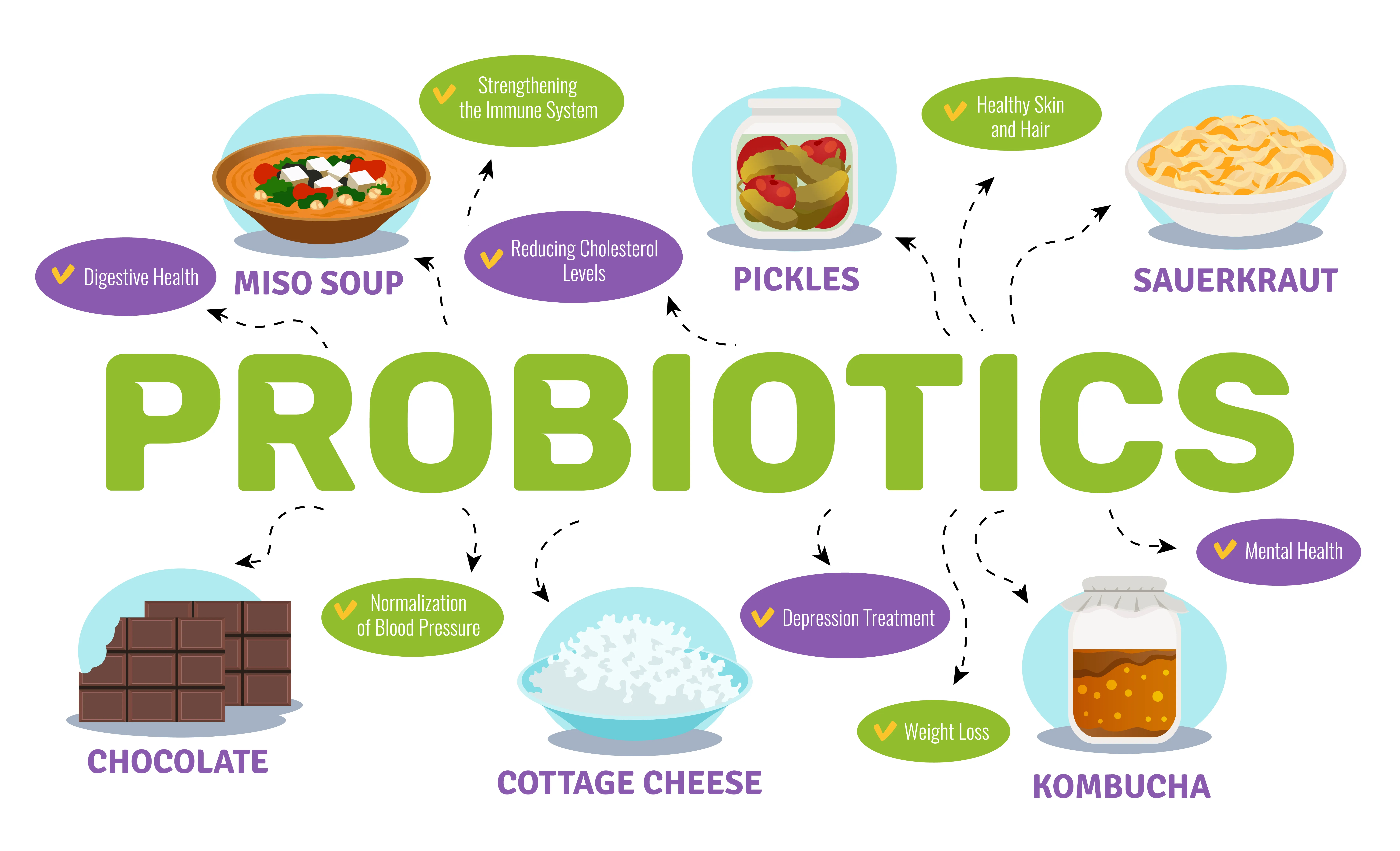 Probiotics are live organisms that aid in the restoration of bacterial equilibrium in the digestive system. They can help cure ulcers and assist in attaining ideal gut health. According to a 2014 analysis, probiotics cannot eliminate H. pylori bacteria. They may lower the number of germs present, accelerate the healing process, and alleviate certain symptoms. Probiotics, when combined with other therapies, may aid in the elimination of dangerous microorganisms. You may also read about Probiotics Digestive Health. Probiotics can be found in the following places:
Probiotics are live organisms that aid in the restoration of bacterial equilibrium in the digestive system. They can help cure ulcers and assist in attaining ideal gut health. According to a 2014 analysis, probiotics cannot eliminate H. pylori bacteria. They may lower the number of germs present, accelerate the healing process, and alleviate certain symptoms. Probiotics, when combined with other therapies, may aid in the elimination of dangerous microorganisms. You may also read about Probiotics Digestive Health. Probiotics can be found in the following places:
- Yogurt.
- Foods that have been fermented.
- Probiotic supplements. However, supplements have larger doses of probiotics per serving.
2. Bananas plantains -
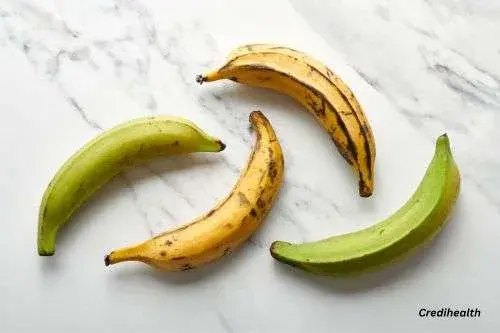 Plantains are varieties of bananas. According to 2011 research, unripe plantains may be beneficial to peptic ulcers. Leucocyanidin is a flavonoid found in unripe plantains. Leucocyanidin promotes mucus production in the stomach. Bananas may also assist in lowering acidity, which can aid in the prevention and treatment for an ulcer in stomach. Also Read: Are Bananas good for Diabetics?
Plantains are varieties of bananas. According to 2011 research, unripe plantains may be beneficial to peptic ulcers. Leucocyanidin is a flavonoid found in unripe plantains. Leucocyanidin promotes mucus production in the stomach. Bananas may also assist in lowering acidity, which can aid in the prevention and treatment for an ulcer in stomach. Also Read: Are Bananas good for Diabetics?
3. Honey -
 Honey is a widely used natural sweetener. Honey has a variety of health benefits for individuals who eat it daily. According to a 2016 study, Manuka honey exhibits antibacterial properties against H. pylori. It implies that honey might be beneficial in the treatment of stomach ulcers. Honey is also used to enhance the healing of wounds, especially skin ulcers, wounds, and scars.
Honey is a widely used natural sweetener. Honey has a variety of health benefits for individuals who eat it daily. According to a 2016 study, Manuka honey exhibits antibacterial properties against H. pylori. It implies that honey might be beneficial in the treatment of stomach ulcers. Honey is also used to enhance the healing of wounds, especially skin ulcers, wounds, and scars.
4. Turmeric -
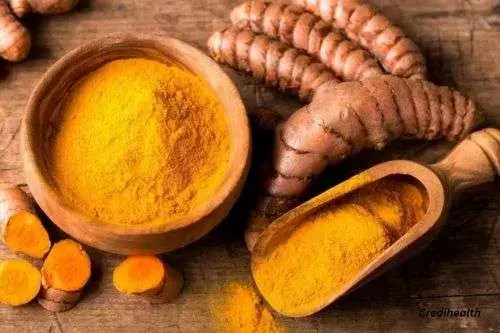 Turmeric is a yellow spice that is widely used. Turmeric, like chili peppers, includes a chemical known as curcumin. Researchers are studying curcumin for its potential health advantages. A 2013 study showed that curcumin contains anti-inflammatory and antioxidant properties that may aid in the prevention of stomach ulcers. Turmeric may help reduce ulcer symptoms and cure sores, according to researchers.
Turmeric is a yellow spice that is widely used. Turmeric, like chili peppers, includes a chemical known as curcumin. Researchers are studying curcumin for its potential health advantages. A 2013 study showed that curcumin contains anti-inflammatory and antioxidant properties that may aid in the prevention of stomach ulcers. Turmeric may help reduce ulcer symptoms and cure sores, according to researchers.
5. Ginger -
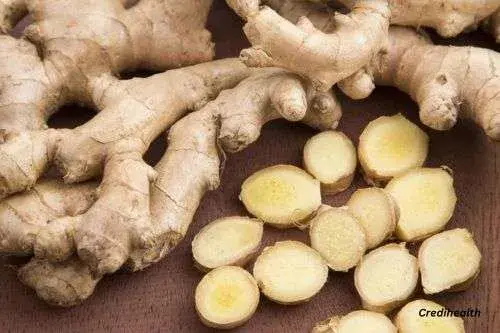 Many individuals believe ginger has gastroprotective properties. It treats stomach and digestive problems such as diarrhea, constipation, and ulcers. According to a 2013 study, ginger can aid with stomach ulcers produced by the H. pylori bacterium. Ginger could also help prevent ulcers induced by NSAIDs.
Many individuals believe ginger has gastroprotective properties. It treats stomach and digestive problems such as diarrhea, constipation, and ulcers. According to a 2013 study, ginger can aid with stomach ulcers produced by the H. pylori bacterium. Ginger could also help prevent ulcers induced by NSAIDs.
6. Garlic -
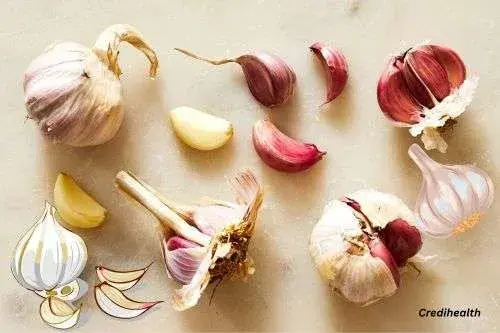 Garlic is widely used to flavor meals in many regions of the world. Garlic contains antibiotic and antibacterial qualities, making it useful in the battle against illnesses. Garlic's effectiveness in curing ulcers has been supported by research. A 2016 research on mice, for example, found that garlic might help reduce the formation of ulcers and enhance the healing process. Garlic also may help reduce the growth of H. pylori, according to a 2015 analysis. According to one small-scale study published in 2015, consuming 2 garlic cloves with each meal twice a day may provide antibacterial activities against H. pylori.
Garlic is widely used to flavor meals in many regions of the world. Garlic contains antibiotic and antibacterial qualities, making it useful in the battle against illnesses. Garlic's effectiveness in curing ulcers has been supported by research. A 2016 research on mice, for example, found that garlic might help reduce the formation of ulcers and enhance the healing process. Garlic also may help reduce the growth of H. pylori, according to a 2015 analysis. According to one small-scale study published in 2015, consuming 2 garlic cloves with each meal twice a day may provide antibacterial activities against H. pylori.
7. Licorice -
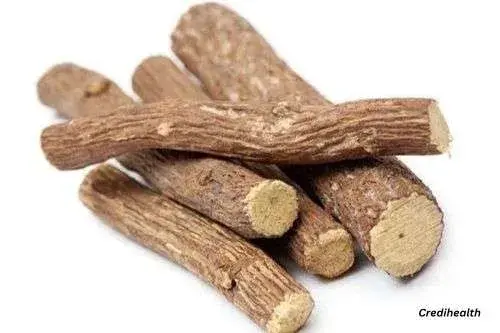 For several hundred years, people have utilized licorice in traditional medicines. Some individuals believe that consuming dried licorice root might aid in treating and preventing ulcers. However, most studies have focused on using supplements rather than dried licorice root. People who wish to use this spice to treat ulcers might prefer to take it as a supplement. According to a 2013 study, eating licorice supplements can help cure H. pylori infections, and the supplement aids in the prevention of bacterial growth.
For several hundred years, people have utilized licorice in traditional medicines. Some individuals believe that consuming dried licorice root might aid in treating and preventing ulcers. However, most studies have focused on using supplements rather than dried licorice root. People who wish to use this spice to treat ulcers might prefer to take it as a supplement. According to a 2013 study, eating licorice supplements can help cure H. pylori infections, and the supplement aids in the prevention of bacterial growth.
8. Flavonoids -
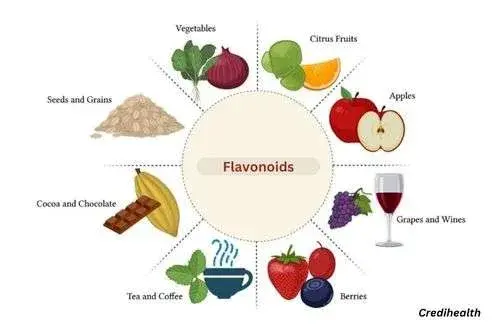 According to research, flavonoids, commonly known as bioflavonoids, could be an excellent additional treatment for stomach ulcers. These are naturally occurring chemicals found in several fruits and vegetables. Flavonoid-rich foods include soybeans, apples, berries, green tea, red grapes, kale, and broccoli. Some foods may also assist the body in fighting the H. pylori bacterium. Flavonoids are gastroprotective; they protect the stomach lining and may assist in the treatment for an ulcer in the stomach.
According to research, flavonoids, commonly known as bioflavonoids, could be an excellent additional treatment for stomach ulcers. These are naturally occurring chemicals found in several fruits and vegetables. Flavonoid-rich foods include soybeans, apples, berries, green tea, red grapes, kale, and broccoli. Some foods may also assist the body in fighting the H. pylori bacterium. Flavonoids are gastroprotective; they protect the stomach lining and may assist in the treatment for an ulcer in the stomach.
9. Manuka honey -
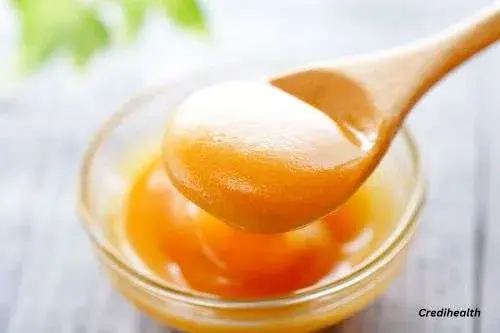 Manuka honey has been found to have antibacterial properties that can help fight the bacteria responsible for causing stomach ulcers. It also has anti-inflammatory properties that can help reduce the inflammation associated with ulcers.
Manuka honey has been found to have antibacterial properties that can help fight the bacteria responsible for causing stomach ulcers. It also has anti-inflammatory properties that can help reduce the inflammation associated with ulcers.
10. Fruits, vegetables and whole grains -
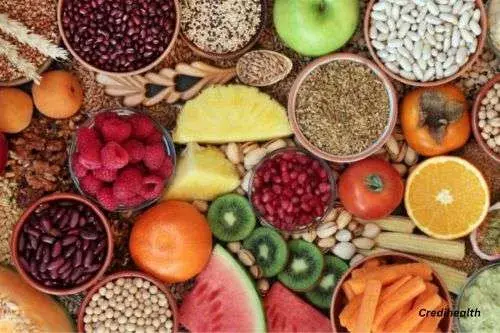 A diet rich in vegetables, fruits, and whole grains is not just beneficial to your general health. A vitamin-rich diet can help the body repair an ulcer. Foods high in antioxidant polyphenols can prevent ulcers and aid in their healing. Polyphenol-rich foods and spices include flaxseed, berries, dark chocolate, oregano, black olives, and dried rosemary.
A diet rich in vegetables, fruits, and whole grains is not just beneficial to your general health. A vitamin-rich diet can help the body repair an ulcer. Foods high in antioxidant polyphenols can prevent ulcers and aid in their healing. Polyphenol-rich foods and spices include flaxseed, berries, dark chocolate, oregano, black olives, and dried rosemary.
Conclusion -
Finding the appropriate treatment for the ulcers may require time, effort, and perseverance, but be aware that ulcers may be treated. People must consult their doctor to determine what's wrong and undergo medical treatment. A gastroenterologist in Bangalore might aid in the treatment of the ulcer. Home treatments can help prevent ulcers from forming in the future and can also help relieve symptoms naturally. Increasing your intake of fresh vegetables and fruits and decreasing your alcohol use will likely put you on the path to health. I hope you understand very well about the treatment for an ulcer in stomach.

Reviewed by







